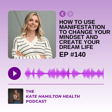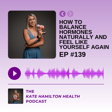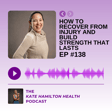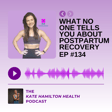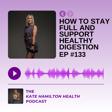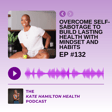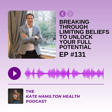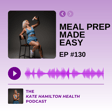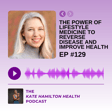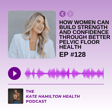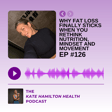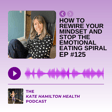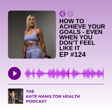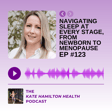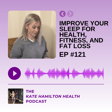
#118: Lexi Barrett: The power of pilates, purpose, and a career change you didn’t see coming
In this episode of The Kate Hamilton Health Podcast, I sit down with Lexi Barrett - Pilates instructor, nutrition coach, and co-founder of Empower Her Retreats - for a powerful conversation on healing, self-worth, and reclaiming health from the inside out. Lexi opens up about her personal battles with mental health, substance abuse, and self-sabotage, and how discovering Pilates and holistic wellness helped her transform her life.
We dive into her journey from life as a high-stress chef in London to launching her new Self-love Club app, which blends Pilates, mindset work, meditation, and nutrition to help women create lasting change. If you’ve ever struggled with self-doubt, burnout, or finding balance, this episode is full of insight and real-life tools to support your mental and emotional wellbeing.
EPISODE HIGHLIGHTS:
[00:00] - Welcome & introduction to Lexi Barrett
[00:17] - Lexi’s backstory: from hospitality burnout to wellness coaching
[03:38] - Transitioning from chef life to a purpose-driven health journey
[07:44] - Why your inner circle matters: surrounding yourself with the right people
[23:22] - Mental health struggles, hitting rock bottom, and finding her way back
[35:31] - The complexity of medication and managing mental wellness
[38:09] - How affirmations and mindset tools support healing
[42:18] - Releasing ego and rewriting personal identity
[47:15] - Breaking the cycle of self-sabotage
[53:47] - Falling in love with Pilates and finding clarity through movement
[58:16] - The key differences between Pilates and yoga
[01:02:21] - Behind the creation of the Self-love Club app
[01:04:28] - Final thoughts and inspiration to start your wellness journey
Links & Resources:
- Connect with Lexi on Instagram here
If you enjoyed this episode, please subscribe, leave a review, and share it with friends who might benefit. For more health and fitness tips, follow me on Instagram and TikTok @katehamiltonhealth.
Music b LiQWYD Free download: hypeddit.com/link/xxtopb [http://hypeddit.com/link/xxtopb] Promoted by FreeMusicPromo [https://www.youtube.com/channel/UCbycji-eySnM3WD8mbxPUSQ] / @freemusicpromo
